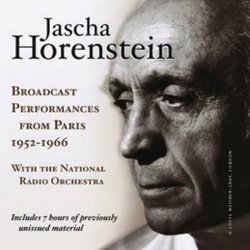| All Artists: Jascha Horenstein, National Radio Orchestra Title: Jascha Horenstein: Broadcast Performances From Paris 1952-1966 Members Wishing: 0 Total Copies: 0 Label: Music & Arts Program Original Release Date: 1/1/2006 Release Date: 1/1/2006 Album Type: Box set Genre: Classical Styles: Opera & Classical Vocal, Forms & Genres, Concertos, Suites, Symphonies, Theatrical, Incidental & Program Music, Historical Periods, Modern, 20th, & 21st Century, Romantic (c.1820-1910), Instruments, Keyboard, Strings, Symphonies Number of Discs: 9 SwapaCD Credits: 9 UPC: 017685114625 |
Search - Jascha Horenstein, National Radio Orchestra :: Jascha Horenstein: Broadcast Performances From Paris 1952-1966
 | Jascha Horenstein, National Radio Orchestra Jascha Horenstein: Broadcast Performances From Paris 1952-1966 Genre: Classical
|
Larger Image |
CD DetailsSimilar CDs |
CD ReviewsA Treasure Trove Johannes Climacus | Beverly, Massachusetts | 09/19/2007 (5 out of 5 stars) "Admirers of Horenstein and collectors of historical broadcasts are strongly urged to acquire this set, expensive though it is. It allows us to hear some remarkable performances by this still-underrated conductor. Repertoire is fairly evenly distributed between works that he recorded commercially and those which are new to his discography. Many periods and idioms are represented--from classicism to modernism--underscoring this conductor's versatility and breadth. But ultimatley it is the depth of his understanding that makes him a great musician. Few conductors entered so fully into the spirit of the composers he ventured to interpret--whether it be the boldness of Beethoven, the tragic impetus of Brahms, or the bitersweet irony of Prokofiev--while retaining a distinctive "tone of voice" that is instantly recognizable.
Among the many treasures here is an devastating account of Brahms's "Tragic Overture" and a similarly intense, yet classically proportioned, rendition of his First Symphony; a minatory Beethoven Ninth whose cumulative power rivals Furtwängler's wartime broadcast recording; a thrilling Sibelius Second that challenges the orchestra to an unexpected feats of virtuosic abandon in music with which they were probably unfamiliar; a surprisingly lyrical, yet trenchant Bartok "Concerto for Orchestra," and some powerfully evocative, yet eminently balletic Stranvinsky (among many other highlights). Among the few disappointments were a somewhat flaccid (and poorly recorded) Ravel G-major concerto featuring Monique Haas (it wasn't a great idea to lead off with this performance on the very first CD), a rock-steady but distinctly low-voltage Beethoven Seventh, and some less than sensuously alluring Debussy (though this impression may be due in part to a distinctly dull and damped-down recording). In virtually every performance anthologized here one will encounter Horenstein's selfless devotion to the music, his judicious ear for balance, his clear-headed grasp of structure, and his mastery of the "long line." Too bad the orchestra isn't entirely worthy of the conductor's genius. With the best will in the world, the French National Radio Orchestra, during the time when these broadcasts were taken down, can't compete with the finest world-class ensembles. They play with far more enthusiasm than refinement (not always a bad thing in itself). The strings can sound scrappy and make a valiant effort--not always successful--to play in tune. The wind and brass playing is uneven, and many listeners will find the French horns' saxophonish vibrato off-putting. One laments the fact that Horenstein never secured a long-term appointment with the Vienna Phiharmonic, the New York Philharmonic, or the Chicago Symphony (to name three ensembles to which his talents would have been particularly well suited). The sound quality varies, as it inevitably does in such archival anthologies, but is frequently better than one might have expected. Occasionally one hears evidence of gain-riding, so that climaxes can be robbed of their (sonic) effectiveness. There is some shattering from time to time at higher dynamic levels (particularly annoying in the otherwise riveting account of Beethoven's Ninth). But too much should not be made of these shortcomings. It's not for refinement of tone or sonic thrills that one will be inclined to purchase this set--it will be for the incomparable artistry of a conductor who never was, but should have been, a household name among concertgoers and record collectors." |

 Track Listings (8) - Disc #1
Track Listings (8) - Disc #1